Two of the major supporting characters for Iron Fist from shortly after his debut in Marvel Premiere were Misty Knight—an ex-police detective with a bionic arm—and Colleen Wing—a sword-wielding martial artist. The pair of them teamed up as private investigators as Nightwing Restorations, and also have done the superhero thing as the Daughters of the Dragon.
In the Marvel Cinematic Universe (Netflix edition), Wing was introduced in Iron Fist, while Knight was introduced in Luke Cage, and where Danny Rand dated Knight in the comics, he falls into bed with Wing in his series, and they have remained a couple. Wing and Knight finally got thrown together in The Defenders (where Knight lost her arm) and they reunited for two glorious scenes in Luke Cage season two (where Knight got her bionic arm).
Then we have the middle episodes of Iron Fist season two and can we for the love of all that is good and noble in this world have a Daughters of the Dragon series PLEASE?????
SPOILERS FOR IRON FIST SEASON TWO, AS WELL AS THE OTHER MCU NETFLIX SHOWS.
I might be slightly obsessive on the subject, but M. Raven Metzner and his band of writers made it clear that this is a thing by taking Rand out of action for several episodes, recovering from injuries and wounds and a broken leg. For the better part of three episodes, and bits of three more, we get this superb pairing that has been a solid partnership in the comics since the 1970s.
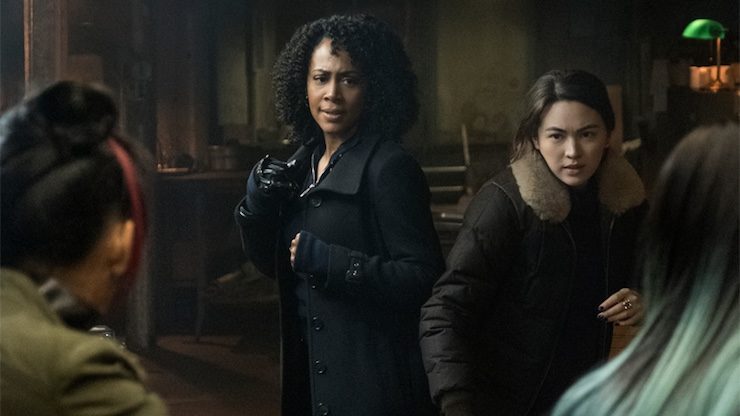
It helps that Simone Missick and Jessica Henwick are simply glorious together. Finn Jones’s slightly whiny affect is far less annoying than it was in his previous season, and I was much more convinced by Rand and Wing as a couple this season than I was last time, but where Henwick and Jones are perfectly fine as a pairing, Henwick and Missick are simply superb. Every time the camera’s on them, they shine, whether they’re talking about what to do next with their lives, Knight’s bitching about Wing’s inability to get her the habañero chips she asked for, or kicking the asses of the Crane sisters at the tattoo parlor.
Buy the Book
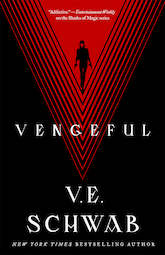

Vengeful
And these bits are by far the most compelling parts of Iron Fist season two. The season overall is far stronger than season one, but that’s a pretty low bar to clear. At the very least, Metzner understands that he’s adapting a superhero comic about a martial artist. Scott Buck, for reasons known only to the voices in his head, decided that Rand Enterprises was an important part of the Iron Fist story (it never ever ever has been), thus giving us a first season that was more Suits than Into the Badlands. Season two has precisely one scene in Rand Enterprises itself, and it’s Ward Meacham leaving the building. That’s it. And it’s as it should be.
The season’s main theme is recovery from trauma. Everyone is dealing with the aftermath of some kind of personal disaster, and how they deal with it shapes the entire season. Rand no longer has his home, as K’un L’un is gone, and the Iron Fist’s purpose—to fight the Hand—is also not a factor anymore, and he spends most of the season trying to figure out who and what he is. Wing has stopped teaching, as that’s a remnant of her life as a disciple of the Hand, and she needs to move past that—but she’s not sure how. She finds her work in the community center to be satisfying, but she also never has an answer to Knight’s question about where she sees herself in five years. It’s also telling that the only time Wing seems alive and happy is when she’s in a fight.
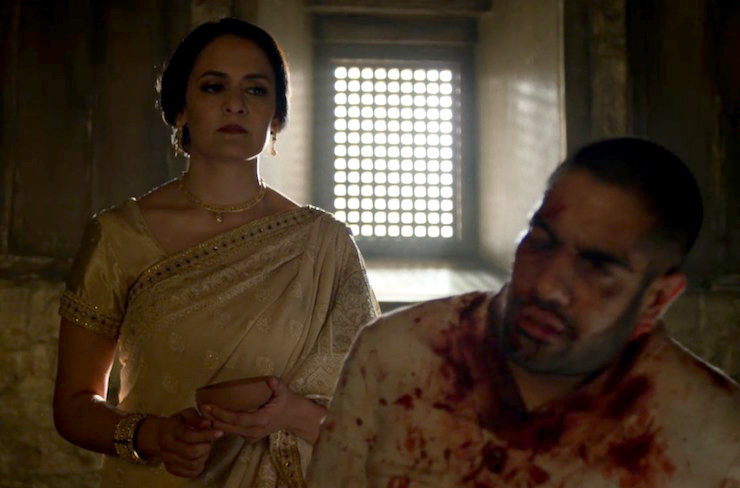
Davos has also lost K’un L’un, but we find out even more about him that explains his behavior: he was raised by, in essence, a pageant Mom. Priya is revealed through Davos’s flashbacks to be a brutal taskmaster, obsessed with making sure Davos becomes the Iron Fist. The earlier flashback to Davos and Rand’s final fight before facing Shao Lao becomes more complex, because Priya’s disgust in that scene wasn’t because she was about to watch her son die but because she didn’t want to watch her son fail. I really wish we’d seen more of Lei Kung—and not just because Hoon Lee is awesome. The dynamic among Kung, Rand, and Davos was an integral component of the comics stories, and adding Priya to the mix is fascinating. But I feel like there could be more.
Sadly, while the backstory is compelling, the front-story falls short. Sacha Dhawan was a high point of season one as Rand’s angry brother with complex feelings about him, but he utterly fails as a straight-up villain. He’s become completely deranged with the loss of K’un L’un, turning himself into a murderer with a messiah complex. This has potential, but it’s all unfulfilled, and it’s sadly on the back of a disappointingly one-dimensional performance by Dhawan, whose controlled rage worked so well last time, but which just makes him stiff and boring as a villain this time. (It doesn’t help that the bar has been set so high by Vincent D’Onofrio’s Kingpin, Mahershala Ali’s Cottonmouth, Wai Ching Ho’s Madame Gao, David Tennant’s Kilgrave, Alfre Woodard’s Dillard, and Sigourney Weaver’s Alexandra.)
Ward’s time in Narcotics Anonymous is one of the best templates for the season, because everyone’s doing the twelve steps to some extent or other. Ward himself keeps trying not to be an asshole, but he has no frame of reference for anything else, and it doesn’t help that every attempt to make up with Joy is batted aside by his sister. Joy herself has plenty of trauma to overcome, as she’s still livid at Rand and Ward for hiding that her father was alive, plus she got shot. That’s not something she can easily forgive.
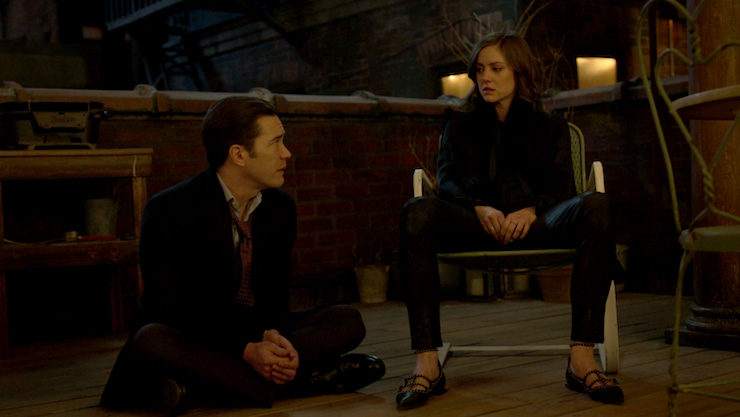
But there’s one great moment between the Meacham siblings on the patio outside Rand and Wing’s apartment, and it’s so beautifully played by Jessica Stroup. It’s when Ward reveals that all the times he was hurt, claiming it was skiing or an accident at home or whatever, it was actually Harold Meacham beating up his son. The change in Joy’s expression is subtle but obvious: she goes from the pure hatred that’s been on her face every single time she’s been in Ward’s presence, to a weird kind of confusion. She doesn’t soften, but this is new information. For the first time she understands that she wasn’t the only victim of Harold’s mendacity. She stops viewing Ward as her enemy at that point, though she never brings herself all the way around to being his loving sister again. But she finally understands that there was a lot more to what happened than Rand and Ward being mean to her.
The plotline bounces the iron fist around like a hot potato, as Davos steals it from Rand—an entertaining adaptation of Marvel Team-Up #63-64—and then our heroes work to steal it back. But Rand doesn’t want it. Because for the first time here we get the notion that the iron fist is, itself, addictive, or at least a distraction. Davos is able to channel his chi into either of his fists, something Rand could never do, and Rand isn’t sure he’s ready to be Iron Fist again. He instead suggests Wing take it.
This is a lovely maneuver, and just makes it more likely that we’ll get our Daughters of the Dragon series (especially since Knight is one of the ones pushing Wing to accept the iron fist, knowing that she’ll wield it right). Or maybe Iron Fist season three can just be about Wing and her cop buddy, since she has the iron fist now…
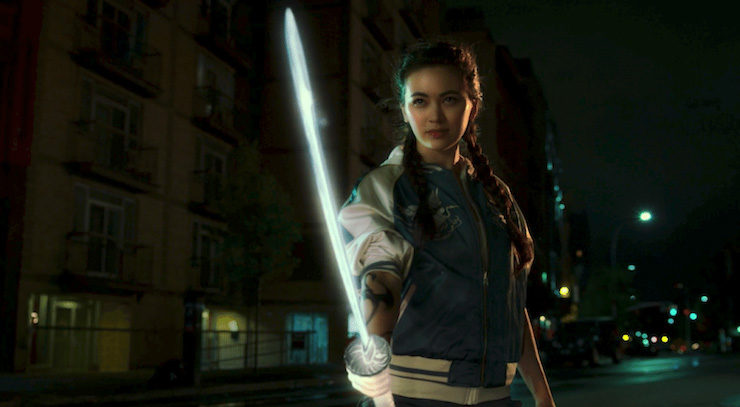
Either way, the seductive power of the fist is an interesting theme, though it’s not as well explored as it might be. It does keep to the recovering-from-addiction theme, as both Rand and Davos see themselves becoming more unstable upon achieving the iron fist. Rand at least recognizes it and refuses it, instead going off to Asia to find out more about the previous Iron Fists, bullying Ward into joining him.
Three other things I want to mention about this season. One is that this series delightfully goes out of its way to pass the Bechdel Test early and often. There are a lot of strong, powerful women in this season, from Joy to Walker to Mrs. Yang (who effortlessly takes over the Hatchet Triads after Davos kills her husband) to Knight and Wing to Priya. And while some of them are defined too often in terms of the men in their lives (Priya and Joy in particular, Wing to a lesser extent), they aren’t all, and aren’t always. It’s done with a minimum of fuss, too. (It’s also fitting. Two of the most influential writers of Iron Fist back in the day were Chris Claremont, who has always written strong female characters, and Jo Duffy.)
Having said that, the most superfluous character this season is Mary Walker. As good as Alice Eve does in translating Typhoid Mary to the Netflix MCU, as fascinating a character as Walker is, and as nice as it is to see a cinematic MCU hit (her trauma happened in Sokovia, the war-torn country that was the centerpiece of Avengers: Age of Ultron), the fact is that you could excise Walker completely from this season and it wouldn’t change anything of consequence. Much as I loved the revelation at the end of the dinner party that Joy and Davos had hired Walker to surveil Rand, ultimately that part of the story never made sense. Of all the people in the world who don’t need to gather intel on Rand, it’s Joy (who grew up with him up to age ten) and Davos (who grew up with him from age ten on up). And she adds nothing to the story, as it feels like she’s meandering over territory that The Punisher season one already covered quite well, thanks. Even at ten episodes instead of thirteen, we find ourselves awash in filler…
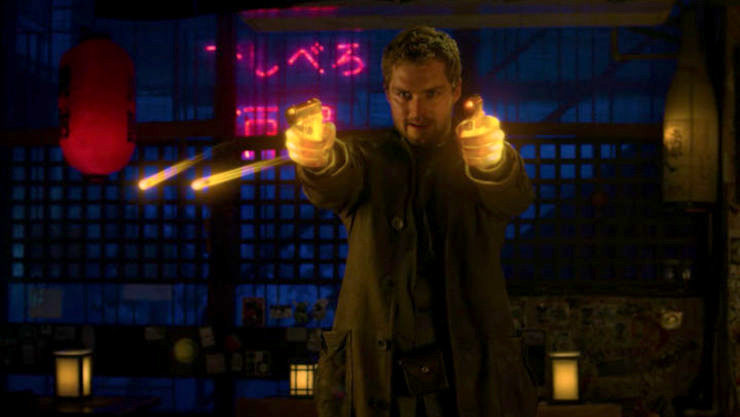
Iron Fist is still the least of the MCU Netflix offerings. Jones remains relentlessly mediocre in the title role. The writing is improved, but still not 100%. I found myself caring much more about the supporting cast than the lead. The final scene—with Wing channeling the fist through her katana and Rand and Ward having adventures through Asia—promises a fascinating third season, at least. I especially like the dual references—one verbal, one visual—to Orson Randall, one of the previous Iron Fists, who channeled his chi through is pistols as we see Rand do in the last scene.
But seriously, let’s just do Daughters of the Dragon and have done with it? Please?
There is a fourth other thing I want to discuss, regarding the fight scenes and the use of martial arts, but that really requires its own article, which we’ll have later this week.
Keith R.A. DeCandido has previously reviewed Iron Fist season one, The Defenders season one, The Punisher season one, and Luke Cage season two for this site. His regular feature, “4-Color to 35-Millimeter: The Great Superhero Movie Rewatch” appears on this site every Friday, and he’s also written about Star Trek, Doctor Who, Wonder Woman, Batman, Stargate, and more. When he’s not dropping pixels here on Tor.com, he’s the author of novels, short fiction, and comics, both in a variety of licensed universes from Alien to Zorro and in worlds of his own creation. His full bibliography can be found here.










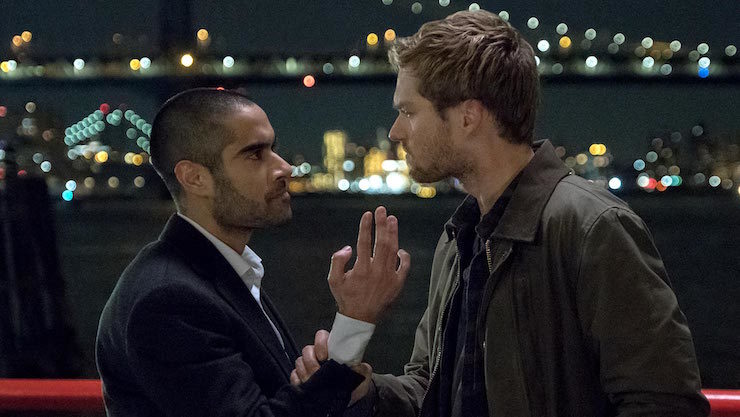
That ending makes me think that Netflix decided to sidestep the whole “Finn Jones isn’t good at martial arts” by having him become the Chi-Punisher and shooting villains with magic guns from now on.
I cheered out loud when Colleen got the Fist, and even louder when her sword lit up. (So she’s basically a Jedi now…) I didn’t think they’d actually go through with it. They’ve done something rare in TV, though less rare in comics: they’ve changed the identity of the series’ title character. Although that’s undermined a bit by revealing in the tag that Danny has inexplicably gotten his powers back offscreen (which also undermines all the trouble they had to go to in order to transfer the powers both times).
Still, they could solve a lot of this show’s problems by officially making Colleen the lead character. Danny’s improved since last year, but a large part of the reason he’s improved is that he’s gradually learned humility and deference to others rather than assuming he always has to be the center of the story. So it would be fitting to keep him in a supporting role, maybe in both IF and Luke Cage.
I thought Mary/Walker was a terrific addition to the cast, impressively played by Alice Eve, and I feel she did have a significant role to play in the story, since she gave Joy an ally after she realized her mistake in siding with Davos, and then created a danger for the heroes by trying to kill Davos before they could perform the Fistectomy (dracocardiectomy?) on him. She was also a useful source of intel on Davos after she switched sides. And I liked how Joy’s acceptance and continued trust in her after learning of her dissociative identity disorder helped redeem Joy as a character — it showed she wasn’t evil, just broken and blinded by rage, but not so much that she’d lost her compassion. It also creates a symmetry, in that you had two female leads who started out the season partnered with men but came to bond increasingly with another woman — Colleen with Danny and then Misty, Joy with Davos and then Walker. Bonding between women was important to the season (see also Colleen winning over Mrs. Yang), so it’s good that Joy had someone to bond with rather than being defined just by her male allies and adversaries. And you could make a case that what gave Danny the advantage over Davos was that he trusted the women in his life rather than just using and discarding them.
Besides, if you want a subplot almost totally unconnected to the main plot, I give you Hogarth in Jessica Jones season 2.
Christopher: I guess, but I still think she felt superfluous. I mean, Hogarth’s plot was disconnected in JJ season 2 also, but Hogarth was also a character we actually knew and cared about and was invested in. Walker, not so much.
—Keith R.A. DeCandido
This IS a better season of Iron Fist than the first, but like you said that was a low bar. However, none of the episodes were as good as his appearance in Luke Cage; I don’t know if that is just a difference in writing, or direction, or being able to play off their partnership.
The “passing of the torch” from Daredevil in the Defenders was glossed over more than I wanted it to be. Yeah, we got to hear about it second-hand, but nothing about him patrolling out “further” to cover Hell’s Kitchen (which is never even mentioned directly).
And, the end… Colleen lit up her sword, and that was cool, in-character, and leads toward the DotD series. I even liked Ward helping him try to track down the cargo. That last scene tho… ugh. Suddenly Danny has recovered another fist, offscreen, and learned to do Colleen’s trick with guns. That felt so cheap, and undermined half of the season. Let’s just throw out all the character development that Danny has gone through this season, with no explanation. Just… no.
At least we got a Daredevil S3 stinger at the end (even tho it got spoiled by conventions). Wonder if he’s going to blame Danny for running off with Ward. At least Colleen is defending the city in his absence.
Alice Eve had the dead thousand-yard stare down pretty pat, and being able to switch it on and off as Mary took forefront control was very well done. Her deadpan statements were quite chilling, especially the bit at the shrink’s office.
I thought it a little strange, though, at the end when she was singing while waiting for Davos, but maybe that was showing a better integration of the two parts; she seemed much more alive in the end. Now we just need to learn what the third part of her is. Walker is already frighteningly competent at fighting, so seeing whatever this third aspect brings will be interesting.
@3/krad: I think the goal here was to create investment in Walker and make us want to see what happens with her next season, and for me, at least, they succeeded. It’s a bit odd that they chose Iron Fist to do it in, since Typhoid Mary is a Daredevil character, but then, the Hand was from DD too.
@5/BonHed: To give you a clue, Typhoid Mary’s third personality in the comics is called Bloody Mary.
@6, Aaaah! I did not make that connection! Okay then, that will be interesting indeed.
Walker wasn’t hired to surveil Danny. She was hired to take him prisoner without killing him when the time was right so Davos could have his ritual ceremony. The surveillance was of her own volition so that she could take him down easily – it had nothing to do with all of the info Davos/Joy already have on Danny. I’m sure they told her plenty, but in the end she needed to see it all herself.
She wasn’t superfluous. Davos trying to take Danny down (and alive) would not have worked. Danny would have his guard up too much around him. So they had to hire a bounty hunter. You had to have that character or the whole plotline wouldn’t really work. Though I guess they could have just had Joy drug Danny at her apartment or something if they didn’t want to have Mary as part of the show…
I think , by the ending, there was an option to “pass the torch” to wing to avaoid all the issues season 1 had moving forward if season 2 didn’t work out.
That said IT worked far better than most of the other 2nd seasons, and was far more even over the season. Part of this is probably that there were only 10 episodes which should be the new standard. Part is that the writing and coreography was better.
I am not sure if any of the other marvel netflix 2nd seasons had me wanting more. JJ season 2 actually turned me off to the character and frankly for me is the worst season of the marvel netflix shows ( I put JJ season 1 as the best). LC made sense but is one of those endings that you need to think about moving forward. DD season 2 ended as a tie into Defenders so you had the whole group get together to get excited about. I am actually excited to see Danny moving forward. And after season 1 I never thought I would say that.
@9/Nels: I suspect 10-episode (or shorter) seasons will be the norm from now on. I read that the previous 13-episode seasons of the Marvel Netflix shows were required by the contract they were made under, but now that contract has been replaced or renegotiated, so they’re no longer stuck doing 13-episode seasons and are free to go with the more compact seasons that seem to work better for serialized TV.
I’ve been repeatedly bouncing around the last scene in my head since Keith and I watched it. It bothered me, too, that Danny seems to have recovered ‘the Iron Fist’ somewhere in his search for the origin of the cargo and Orson Randall.
But then something clicked and I wondered. What if he did not recover the Iron Fist in his search for Orson Randall. What if he found Orson Randall’s pistols?
What I’m saying is, what if that’s the only way he can utilize the harnessing of the chi in that way? With the pistols.
We will have to wait for the next series to find out.
@11/Wrenn: What I gather is that Randall’s “gun fu” technique let him extend his own “Heart of the Dragon” power into his guns as an extension of his hands, which is consistent with what Colleen did with her sword. Since it’s a chi power, I’d imagine it has to emanate from a living being with a spiritual essence, rather than an inanimate object.
Although I suppose that if you can extend your chi into an object that you’re holding, it follows that it might theoretically be possible to somehow craft or enchant that object to store the chi for later retrieval, like a battery.
I wonder if we are getting a Seven Capital Cities of Heaven storyline in the next season? It could explain Danny regaining his powers again.
Davos was raised by “a pageant mom.” Hah! That’s perfect. I didn’t find his character compelling at all, for multiple reasons. As I said before, would’ve shrunk down his storyline to less than half the season. He gets the fist then, out of the blue, decides to take on Danny’s mission and save NYC? Why? Yes, he’s deranged, but it makes no sense even then.
The absence of K’un L’un is the huge elephant in the room. This show either doesn’t have the budget or the will to truly do Iron Fist right. There could be a Capital Cities of Heaven storyline or adaptation of the Immortal IF tournament. That’s why the expansion of the mythos in the final scene was so good. Danny is not and never was a compelling street-level character. Be done with that already. The Pirate Queen story suggests season 3 may be moving in that direction.
Meanwhile, this season, there’s still no representation of the heavenly city or any dragon. That’s partly what made Danny so ridiculous in season 1. You can’t have a character spouting mystical nonsense without showing anything visually. Makes him sound nuts and undermines the whole project. In essence, it’s what Davos became. Danny dialed up to maniacal levels.
The moment when Colleen’s katana lights up is my favorite. That’s how you do stuff for the fans. I’m tired of people hired to do genre material who aren’t fans of it. (Famous example: JJ Abrams: “I’m not really a Star Trek guy. Never really watched it. I’m more of a Star Wars guy…” Well, fuck off then, JJ!) Ahem.. ok, then.
Added tidbit: someone mentioned elsewhere that Colleen’s boss at the center is the character who becomes Blindspot in the Daredevil comics. So another bit of DD lore borrowed.
@14/Sunspear: Davos taking over Danny’s mission makes sense to me, because they’re both basically using the same logic: The role of the Iron Fist was to defend K’un Lun and destroy the Hand, but now both those things are gone, so they need to find some other place to defend — and, in Davos’s thinking, some other enemy to destroy. Besides, Davos’s primary motivation was his belief that he deserved the Iron Fist more than Danny did and would use it better — so it makes a petty sort of sense that the first thing he’d try to do with it upon stealing it from Danny was to go Ethel Merman on him (“Anything you can do, I can do better”) and try to outdo Danny at his own chosen mission. He essentially said as much outright more than once.
I felt kind of sorry for Davos. Because of his demanding, emotionally abusive mother, he grew up obsessed with the need to prove himself worthy, to show that he was good enough to earn his mother’s approval at last. So that warped and limited his view of the world. All he could think of was the competition, beating everyone else, proving himself physically and morally superior to everyone else. It made him kind of a dark reflection of Danny, who’d started out in season 1 just taking it for granted that he was more right and more entitled than everyone else, but has spent the past three seasons of Iron Fist and Defenders getting less fixated on being the best and more humble and respectful of other people’s worth. And here’s his blood brother Davos going in the opposite direction, getting more and more fixated on being better than everyone else. Maybe the reason Davos doesn’t stand out so strongly as a villain in his own right is that he was more a symbol of what Danny was outgrowing. (Although I thought Sacha Dhawan did a terrific job in the role.)
@15. CLB: I see what you’re saying and it makes story sense, but still underwhelming and undeserving of a season’s arc. Same with Joy’s arc. Yeah, she’s mad about being deceived, but homicidally angry?
This extension of motivations has plagued other Netflix/marvel shows. JJ2 was so overextended that I lost sympathy for the rage monster that was J’s mom. Shorter seasons will be a blessing because there’s simply not enough story and character motivations have looked like Stretch Armstrong, sagging and deformed.
I’d disagree somewhat about Dhawan’s performance. He’s a good actor, but reminded me of Lennie James’ (another good actor) performance in Low Winter Sun. This high intensity, invading personal space type of physicality. Only I’m shorter than you, so I have to actually look up at you while I’m trying to be intimidating. Was actually annoying to watch, besides being unconvincing to me.
I basically agree with CLB’s comments here and don’t have much to add beyond that. I am looking forward to S3, which I never thought I’d say after S1.
@16/Sunspear: “Yeah, she’s mad about being deceived, but homicidally angry?”
KalvinKingsley‘s point in comment #8 bears repeating: Joy didn’t hire Walker to kill Danny, but to capture him so that Davos could steal his power. Joy wanted to make Danny hurt and take away something precious from him, in retaliation for how (in her view) Danny and Ward had taken her memories of her father away from her. But she wasn’t homicidal. She didn’t consider killing anyone until Walker convinced her that killing Davos was the only way she’d be safe.
As for Dhawan, I think he proved quite well that you don’t have to be tall to be intimidating, because it’s all about attitude. Heck, Alice Eve is two inches shorter than Dhawan, and Walker was intimidating as hell. Anyway, it’s rude to dismiss people for their height. You’ve found it necessary to make derogatory remarks about Dhawan’s height in both Iron Fist threads this past week, and frankly I find that extremely petty.
@CLB: Alright, never mind the stature thing. For whatever reason , despite the overacting, I find him non-threatening. Which, to be fair, may not be the actor’s fault. Davos’ entire reason for being is guided by envy and, as of season 2, proving himself to his mother. Toxic Mom: “Better I were barren than to bring a disgrace like you into this world. Second best. The fool who lost his birthright to an outsider. I thought I’d raised a champion. I was mistaken.” Resorting to murder to impress your (supposedly dead) mom is petty motivation. Compare that to the charisma displayed by Bushmaster in LC2 in you have some idea why Davos is a poor villain.
If there had been a broader scope all along, actually including mystical cities that we can see, perhaps it wouldn’t seem so vacuous. Again, not the actor’s fault if the conception was faulty (or budget was lacking). Although, he doesn’t seem especially better at martial arts than Finn, yet isn’t faulted. Imagine Lewis Tan as Davos… or IF, for that matter.
Btw, I find Colleen completely convincing as the new badass IF. So you’re right, not a size thing.
@19/Sunspear: Well, we disagree on Dhawan. I agree he doesn’t superficially look threatening; he actually has a very gentle-looking face and a soft-spoken voice. But I think he was most effective at making Davos feel dangerous and powerful, both physically and in personality/presence. The contrast with his appearance and voice actually enhanced that for me.
And tons of fictional heroes and villains are motivated by parental issues. What about Loki? His sense of being second-best in his father’s love was what drove his betrayals and acts of villainy. Davos isn’t that different. And everything Mariah Dillard did for two seasons of Luke Cage was driven by her conflicting feelings about her mother.
@20, STOKES, Mariah STOKES
I loved that bit.
@21:
That’s because the father wound is a real thing, and really, really common. Its not surprising that writers choose to write about it. Its nice to see it gender-swapped here in IF2.
@22. Anthony: I don’t know about it being nice. Davos’ mother wishing she’d never given birth to him is way over the top melodramatic. Some stage operas may even blush at that level of overblown characterization. And as I’ve suggested before, trying to impress your mommy is not very good motivation for an Immortal Weapon. Don’t think even the comics, also subject to operatic storytelling, would go for that.
@23/Sunspear: What an utterly bizarre thing to say. As I already mentioned, it’s enormously common in fiction for both heroes and villains to be motivated by parental issues.
The tone here seems to be getting a little aggressive/nasty; please keep the discussion civil, and don’t make disagreements personal.
All right, my apologies. It wasn’t a serious comment. Totally tongue-in-cheek tone intended.
Sure, thanks for clarifying (tone can be difficult to judge sometimes!) Receding back into the void now…
Another try: can’t off top of my head think of any other supervillain with domineering mom issues. We’d have to go into horror territory for someone like Norman Bates. So while parental issues may be a common theme, doesn’t mean it was well handled here.
@29:
That’s exactly why I said its nice to see it gender-swapped. These formative wounds are usually thrust on to the father, and mothers are usually (not always) represented as either weak and ineffective, or nurturing paragons. But, like all parents, mothers are capable of seriously messing up their children as well.
@29/Sunspear: So just because you can’t think of an example, that makes it bad writing? That makes no sense. And why should it make such an insurmountable difference whether the parent that motivates the character is male or female? Why should it make any difference at all?
@CLB: Don’t know if it’s bad writing, but just because you use a universal theme doesn’t automatically make it good motivation. Despite the gender swap, it’s rather generic. Add the comment I quoted and it becomes overwrought. The tone is off.
@32:
Its difficult to convey the concept of “I wish we’d never had you,” or “I wish I’d had a different child” or “You’re not worthy of me as a parent” in a five second reaction shot without coming out and saying those things, so I can understand how the scene might come across heavy-handed and manipulative in this instance, but I assure you, as far as formative and influential motivations go, its about as powerful as they come, and lots and lots and lots of children grow up feeling that their parents think of them that way, especially in less modern societies, or even 30 years ago here in the West.
I don’t see how its a weak, or unworthy underlying driving truth for Davos in this instance, especially given the parallel, since its the SAME damn motivation and underlying wound that Danny’s other quasi-brother is dealing with.
@33. Anthony: If I accept what you say, then Davos, Ward, and Joy are all villains or doing villainous things because of parental abuse. This then becomes a fraught subject. Ward has a sort of redemption arc, even though he gleefully tells Turk he killed his father… twice. Joy is pathologically angry and somewhat confused. To drive the plot, she partners with Davos to hurt Danny, when really her father and brother were the main drivers of deception. Danny was a late arrival to Meachum the abusing father’s schemes.
And Davos? Davos still leaves me underwhelmed. His reasons for pursuing the iron fist are just as empty as Danny’s. In the first season we got Danny cluelessly talking about mystical cities and dragons, while other characters said “Sure, right, whatever.” So if I were to make a case for Davos: Danny deserts his post as protector after earning the fist. His “brother” is rebuffed repeatedly and fails to pursuade him to come back. After K’un L’un goes missing, which mystical cities are wont to do, Davos becomes deranged. This on top of the soul twisting as a result of his mother’s cruelty. (Btw, we only saw a few guards and some Hand dead. Why were they so quick to assume the city destroyed? The rubble is not frickin’ there!)
Answer? Take the fist from Danny by force, involving tattoos and a golden bowl maguffin, then illogically take over Danny’s mission to show him how to protect the city. (Danny’s really only covering a neighborhood, and not even the one he promised to protect.) While Joy comes to her senses somewhat, Davos’ pathology only gets worse. He is massively petty in his thinking. His derangement drives the plot, but he’s nowhere close to similar character motivations in Kingpin or Killgrave.
If we had true stakes, meaning we saw more of the society and environment of Danny’s missing years, this wouldn’t seem so nebulous and small-scale. And the show wouldn’t endlessly tell us about it instead of showing.
@34:
You mistake motivation with responsibility. So do a lot of people. But there’s a large difference between having empathy for someone and excusing their behavior. The motivations behind people’s decision making does not affect their own culpability or responsibility for those decisions one bit. But it does help enlighten the character. I much prefer villains whom I can empathize with. It doesn’t mean I approve of their decisions.
Which is entirely intentional, I’m sure, and likely a commentary on those who chose to reach for power rather than release it.
Davos was always deranged. There’s nothing sane about how those monks raised him and Danny. It may be a cultural insanity, but Davos was definitely neck deep in it.
Um, yeah. His goal is to prove to himself and to Danny that he is better than Danny, and that he would have been a better choice for the Fist than Danny. I can’t think of a better way to do that now that Kun Lun is gone than to be better at protecting New York than Danny was.
Joy actually has people in her life she can count on, and was pretty incredibly functional to begin with considering everything that happened. She didn’t get abused by her father because he was dead to her. Even before Harold’s death and resurrection, Ward got all the abuse. Davos, however, was abused both physically and mentally from the time he was an infant until the moment everything in his life was taken from him. He has nothing, so its not remotely surprising that Joy comes to her senses and Davos doubles down.
I agree with the first part. I disagree with the second. The reasons behind his deranged sociopathy are almost identical to Fisk and Killgrave (massive, systemic abuse from a young age on). Its his goals that are different. That’s the part you seem to really not like. Davos has petty and small ambitions when compared to those other two, that’s for sure. Although, I think its fitting that Davos’ goals are small and petty. He grew up in isolation, and to this point, we have no confirmation that he had any understanding of the rest of the Kingdoms outside of Kun Lun. Davos was raised and abused and prodded and shaped to become a tool of Kun Lun–the Iron Fist. His ambitions are correspondingly small. Hurt the person who took that away from him.
I’m sure you’re right that an expansion on Kun Lun and the Kingdoms of Heaven would have massively improved this show. But that doesn’t seem to be a story that the writers were interested in telling. When conceived, these were supposed to be street-level shows that could fit in the cracks of the MCU. An expansion of what Kun Lun and that mysticism means doesn’t really fit with that initial idea. IF was just the wrong story to tell.
@34/Sunspear: “And Davos? Davos still leaves me underwhelmed. His reasons for pursuing the iron fist are just as empty as Danny’s.”
Yes, that was the whole point. Davos was intentionally a reflection of Danny, someone who was just as driven by his sense of entitlement to the Iron Fist and his addiction to the power it gave him. The difference was that Danny learned over the course of the season to transcend those things and become better, while Davos was trapped by them and thus just grew worse. Davos was the kind of antagonist who symbolizes the personal flaws that the hero has to overcome within himself. It’s like he was defeating his own dark side.
“(Danny’s really only covering a neighborhood, and not even the one he promised to protect.)”
As I recall, Matt asked him to protect the city, not just Hell’s Kitchen.
@anthony: “IF was just the wrong story to tell.”
Agreed. And the dissonance accounts for why Danny sounded so ridiculous in the first season when spouting mystical nonsense. His supporting cast just rolls with it in the second season.
Don’t think we’re far apart, as I was making a case for Davos that the writers seem to be pushing. The season was an attempt at course-correction, with Davos the only one wearing the true IF mask, if briefly. Dhawan said in an interview that the show didn’t want the mask hiding his anger. Some of what they did was specifically to push against the white savior type. Which is why it was so awesome to have the fist land with Colleen.
@CLB: stating that the point I’m making is the point seems redundant. I’m aware of what I’m saying, of what the show is trying to do, and simply saying it’s not good enough.
I still haven’t finished watching this season, but it’s decent so far. Honestly, I didn’t hate the first season like so many people, so I was quite interested to see how they handled S2. To keep it short, I’ll just say that I think they made the biggest mistake with Joy’s character (the writing, the actual actor is fine), but the episodes are still okay.
Ward, Colleen, Danny, Mary and Misty all work so far. Alice Eve is very good indeed, and Pelphrey continues to do great work. I actually do think Davos works, to an extent, and I have no problem with the actor either — he seems fine for the role. His fighting scenes, to me anyway, are actually more convincing than the ones with Danny, which is something I saw someone else point out. (Colleen also has good fight scenes.)
Looking forward to seeing the article about the use of martial arts in this season.
Peake: I finally got that article finished today (Monday). Not sure when it’ll go live on the site, but Tuesday at the earliest. :)
—Keith R.A. DeCandido
No comments about the changing color of the Fist? I thought it was interesting that the final color was white, while both Danny’s and Davos’ Fist, in retrospect, were colored. Almost as if their use of the power was incomplete, only part of the rainbow.
@40/fcoulter: I think it’s more than each wielder has their own color — yellow for Danny, red for Davos, white for Colleen. A different Iron Fist from history might’ve had a blue light or a green one, maybe. (Samuel L. Jackson’s Iron Fist would no doubt be purple.) Although the colors did seem to reflect the characters of the wielders — Davos getting the “angry” color and Colleen getting the color that implies purity and completeness. They did want to make us feel that Colleen getting the Fist was right, by making the light as pure and beautiful as possible, in the same way that making Davos’s Fist the color of blood made it seem dangerous and tainted.
Reading this after finally finishing the season and just wanted to go back to some early comments and not that the show explicitly tells us that those are Randall’s guns (Danny says he’s not giving them back) and while the guns themselves weren’t the source of power in the comics, this isn’t the comics.